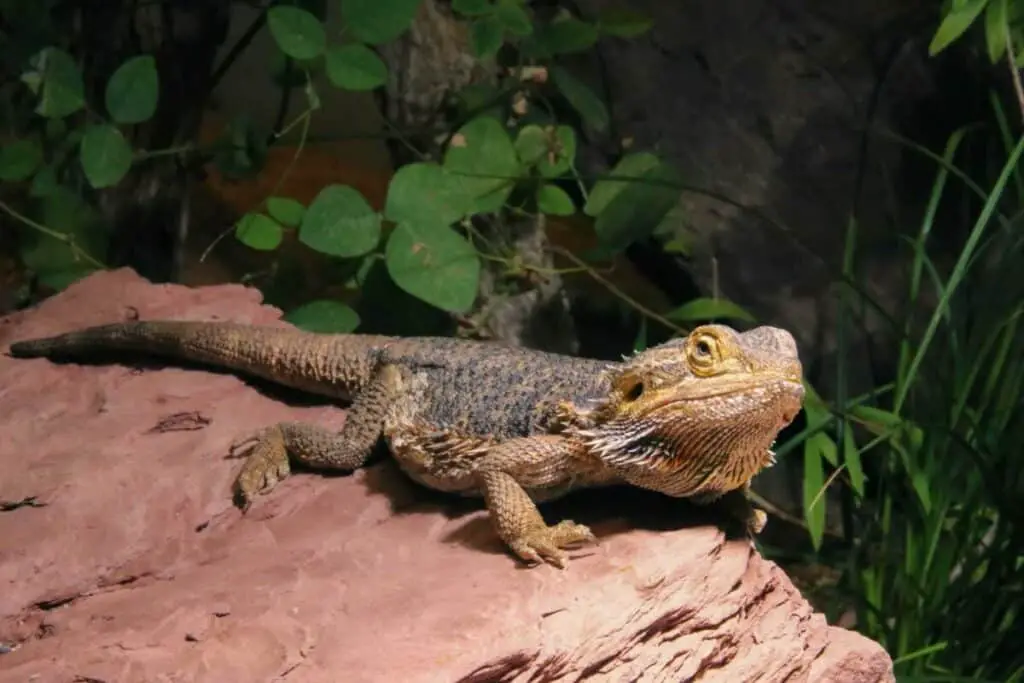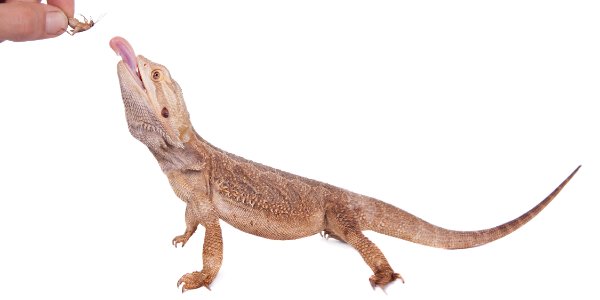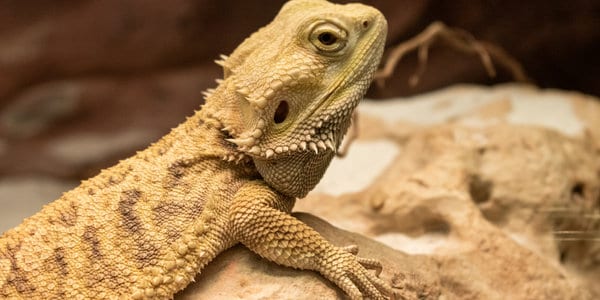Bearded dragons are the most popular exotic pets in the world, and for a good reason, they are easy to handle, curious, friendly towards humans, and look like real mythical creatures. Novice reptile owners might not know how to properly take care of their bearded dragon, resulting in it being underweight.
Poor diet and husbandry can cause illness and stress, which are the leading causes of an underweight bearded dragon. Bearded dragons require a special diet and supplements to stay healthy. Correct lighting is essential to ensure good digestion and absorption of calcium.
The rest of this article will include an in-depth look at why bearded dragons might become underweight, how much bearded dragons should weigh, how to get an underweight bearded dragon to gain weight, and what a proper bearded dragon diet entails.
Leading Causes of an Underweight Bearded Dragon
There are numerous reasons why a bearded dragon can be underweight, but the leading causes are poor diet, poor husbandry, and improper lighting and heat.
You need to feed your bearded dragon a specific diet consisting of leafy greens, vegetables, fruits, and insects. They also require the right supplements and lighting to stay healthy and happy. Bearded dragons can get stressed if you keep them in a dirty enclosure or one that is the incorrect size and does not have the accessories they need.
Ensuring that your bearded dragon is fed a proper diet and has a suitable enclosure and lighting is the first step to a healthy beardie.
Diseases That Can Lead to an Underweight Bearded Dragon
There are many diseases that your bearded dragon can get. Still, you can avoid most conditions if you make sure you keep your bearded dragon’s enclosure clean, that they eat a healthy diet supplemented with calcium and vitamin D, and have the proper lighting and heating.
If your bearded dragon’s environment and diet are not healthy, it can get any of these diseases, which will lead to your beardie losing weight and may even be fatal.
Metabolic Bone Disease (MBD)
Metabolic bone disease is a life-threatening disease resulting from malnutrition, a lack of calcium, and incorrect lighting. If your bearded dragon doesn’t get enough calcium from its diet and doesn’t have the correct UVB light to assist in Vitamin D3 production, your beardie’s body will start drawing calcium from its bones.
Symptoms include:
- Bumps
- Twitching
- Tremors
- Seizures
- Paralysis
- Bone deformities
- A soft rubber-like jaw
- Fractured bones
- Death
Adenovirus
Adenovirus is a severe viral infection that causes inflammation in the liver, kidneys, digestive system, and nervous tissue. Bearded dragons can be born infected with the disease or contracted from another bearded dragon.
Adenovirus is treatable if caught early, but the bearded dragon will stay infected throughout its life, and you should keep them away from other beardies. The bearded dragon can live a long life but may have flare-ups.
Symptoms include:
- Loss of appetite
- Lethargy
Yellow Fungus Disease
Yellow fungus disease can be fatal and is caused by stress, inadequate nutrition, and a dirty enclosure. The first thing you will notice is a discolored patch of scales; if you see this, your beardie should be taken to the vet immediately. If left untreated, the fungus can spread, causing the infected area to rot.
Symptoms include:
- Abnormal shedding
- Swelling
- Scales falling off
- Discoloration
- Open wounds
- Lethargy
- Anorexia
- Death
Parasites
Your bearded dragon can have many different parasites, so take it to the vet immediately if you think this is why they are ill. Parasites are treatable, and your beardie has a good chance of making a full recovery. If your bearded dragon has an appetite and is eating healthy but is losing weight, it might have parasites.
Symptoms include:
- Diarrhea
- Lack of appetite
- Bloody stool
- Dehydration
- Anorexia
- Vomiting
- Death

Healthy Bearded Dragon Diet
A healthy diet is one of the best ways to ensure your bearded dragon stays healthy and does not become underweight. In the wild, these fantastic creatures have all the right food to ensure they stay healthy, but it’s your responsibility to make sure they eat a healthy diet in captivity.
Feeding your bearded dragon the wrong food or not a big enough variety can lead to them becoming picky and losing weight. Bearded dragons are omnivores and require both a plant and insect-based diet. Thus in order to properly care for your beardie, their diet needs to be as close to their natural diet as possible.
Hatchlings and Baby Bearded Dragon
Hatchlings and baby bearded dragons (0 – 2 months of age) need to be fed insects 2 to 3 times a day. They need protein to grow and develop. When feeding baby beardies, make sure that the insects aren’t too big; pinhead crickets are the ideal size. Always make sure that the insect is no bigger than the space between their eyes.
Juveniles
Juvenile bearded dragons eat a diet consist primarily of insects and need to be fed 2 to 3 times a day. Baby and young bearded dragon will eat many more insects than adult bearded dragon; however, the number of insects they eat per feeding may vary. You should take note of how much your baby beardies consume in a sitting, and judge your amounts from there.
Adult Bearded Dragons
Adult bearded dragons will eat more leafy greens, veggies, and fruits as they age, but they still need to eat insects, too, as insects are their primary source of protein. You should feed your adult bearded dragons twice a day.
The best way to get your bearded dragon to eat is to set eating times. Feed them every day at the same time and give them a specific amount of time to eat. You can feed them in their enclosure, but it might be easier to place them in a feeding tank when feeding them live insects.
Give them a certain amount of time; 10 to 15 minutes will be perfect and remove any insects they didn’t eat. Ensure no insects are left in your bearded dragon’s enclosure if you feed him in his cage.
Bearded dragons go into brumation when temperatures drop in the winter. Brumation means that your bearded dragon might stop eating but still be awake and drink water. During this period, they might eat occasionally, so make sure that they have fresh food available.
Healthy Foods for Bearded Dragons
Once your bearded dragon has reached adulthood, it’s best to stick to a healthy diet plan.
Leafy greens will be their staple food and should be given to them daily, and you should feed insects to them five to six days a week,
It’s best to feed your beardie vegetables around four days a week and fruit only once a week. Make sure to mix up their food to keep their diet exciting and tasty.
Healthy leafy greens for your bearded dragon include:
- Endive
- Dandelion greens
- Escarole
- Bok choy
- Collard greens
- Mustard greens
- Rocket
- Watercress
- Chinese leaf
- Turnip greens
On occasion, Kale, parsley, and swiss chard can be given to your bearded dragon but shouldn’t make up part of his everyday diet.
Healthy vegetables for your bearded dragon include:
- Broccoli
- Okra
- Peas
- Green Beans
- Zucchini
- Yellow squash
- Carrots
- Sweet potato
- Bell pepper
- Pea shoots
- Peeled cucumber
- Acorn squash
- Butternut squash
- Button mushrooms
- Pumpkin
- Asparagus
- Brussel sprouts
- Snap Peas
Healthy fruits for your bearded dragon include:
- Apples
- Blackberries
- Blueberries
- Raspberries
- Strawberries
- Peaches
- Plums
- Watermelon (remove seeds)
- Figs
- Kiwi
- Papaya
- Melon
- Grapes
- Dates
- Apricots
- Bananas
- Pears
- Pineapple
Fruit contains a lot of sugar, so you should feed fruits in moderation and always remove the seeds.
Healthy insects for your bearded dragon include:
- Crickets
- Cockroaches
- Superworms
- Silkworms
- Butterworms
- Mealworms
- Earthworms
- Waxworms (These worms are high in fat, so feed in moderation.)
- King worms
- Hornworms
- Black soldier fly larvae
Adult bearded dragons can eat small pinky mice occasionally.
Important: Ensure that all food given is smaller than the size between your bearded dragon’s eyes, or it can cause intestinal blockages, which can be severe. It’s always best to shred fruits and vegetables.
Food should always be fresh and never feed dead insects to your bearded dragon.
Food to avoid giving to your bearded dragon includes:
- Iceberg lettuce
- Avocados
- Citrus fruit
Keep your insects safe and healthy before feeding them to your bearded dragon. You can feed them vegetables or buy special insect food at your pet store. Never give your bearded dragon any insects or plants found in the wild as they may be contaminated.
Always ensure that your bearded dragon has fresh, clean water. You can provide water in a shallow water dish and through misting.

Nutrients and Supplements
Your bearded dragon needs supplements to stay healthy, especially calcium.
You may purchase Calcium from your pet store in powder form. Bearded dragons need a lot of calcium to stay healthy and avoid illness, so calcium should be purchased separately and not as part of a multivitamin.
When feeding baby and juvenile beardies, the insects should be gut loaded with calcium and dusted with calcium powder before feeding. For adult bearded dragons, you can brush their greens, vegetables, and fruit with calcium powder. You don’t have to dust their insects with calcium powder, but you need to ensure the insects are gut-loaded with calcium.
You need to provide hatchlings and baby bearded dragons with calcium in their food daily, whereas you can give juveniles calcium five times a week. Adult bearded dragons should get calcium three times a week.
It’s also highly recommended to give your bearded dragon vitamin D and multivitamin supplements to ensure they get all the nutrients they need. When buying a multivitamin, include magnesium, iron, and iodine.
Most people struggle with underweight bearded dragons, but captive bearded dragons can get obese. If your dragon is overweight, cut out any fatty insects and fruit from your bearded dragon’s diet, which will assist them in losing weight.
How To Help an Underweight Bearded Dragon Gain Weight?
If you have a skinny bearded dragon and you are worried, the best thing to do is take it to a vet to know the reason behind your bearded dragon’s weight loss, but if that’s not possible, we want to give you the best chance to help your bearded dragon gain weight and be healthy.
Here are some tips that might help with weight gain:
- Clean your bearded dragon’s enclosure regularly. Bearded dragons are sensitive and might not eat in a dirty environment.
- Place your bearded dragons’ enclosure in a quiet place. Beardies get stressed easily, and if there’s too much going on around them, they might get distracted and anxious.
- Ensure that your bearded dragon’s cage is big enough and ensure the temperature and lighting are correct. Beardies need the proper lighting to help them absorb calcium and digest their food.
- Feed your bearded dragon a balanced diet. Some bearded dragons are picky eaters, and if you don’t give them a variety of food, they will stop eating.
- Try feeding your beardie by dropping their greens, vegetables, and fruit into the enclosure as you would do with insects. Doing this might encourage them to eat.
Healthy Weight for a Bearded Dragon
Adult bearded dragons vary in size and weight, so it’s often difficult to establish whether your bearded dragon is underweight or overweight. If you want to make sure your beardie is healthy and not losing weight, you can track their weight by weighing them weekly. Also, there is no much difference between the size of male and female bearded dragon.
Healthy adult bearded dragons weigh between 12.3oz and 21.2oz (350g to 600g). Look for protruding bones, especially on bearded dragon’s hips and foreheads, as this can signify underweight.
Beardie Enclosure Setup To Ensure Healthy Eating
- Your bearded dragon’s enclosure needs to be safe and secure. You can’t keep your beardie in a wire cage as the enclosure needs to retain the heat.
- Make sure your bearded dragon’s cage is big enough. Your enclosure needs to be a suitable size, or your beardie may suffer stress. Also, ensure you place it in a quiet area so that your beardie doesn’t get stressed.
- Use a suitable substrate. Ensure that there is nothing in your substrate that is poisonous or can be swallowed and cause your beardie to choke and suffocate.
- You should add accessories like logs, branches, and plants to your bearded dragon’s enclosure. All logs, branches, and rocks need to be big enough so that the bearded dragon can comfortably sit on them, and there should be no sharp edges on them.
- A bearded dragon can easily get stressed if its enclosure is not cleaned. A dirty enclosure is one of the main reasons why bearded dragons get sick and lose weight. Make sure that you clean your bearded dragon’s enclosure regularly and that your beardie has a safe place like a rock cave in its enclosure to hide when feeling stressed.
- All accessories should be secure and non toxic. Your accessories should be secured so that they don’t move when your bearded dragon climbs on them, and you need to make sure that the plants you add are not toxic.
Lights and Heating Lamps
Having the right lights and heating lamps are one of the most critical aspects of ensuring your bearded dragon stays healthy.
Bearded dragons need a UVB light in their enclosure to help them get enough vitamin D3. The best source of vitamin D3 is the sun, but since your beardie lives inside, you have to make sure he has a UVB light.
Without a UVB light, your bearded dragon will not have the vitamin D3 it needs to absorb calcium, which can lead to an array of illnesses such as MBD (Metabolic bone disease). You need to place a log or rock under the UVB light so that your beardie can bask and get all the vitamin D3 he needs.
Your bearded dragon also needs to have a regular day and night cycle, so you’ll have to install a UVA light. This light will provide the correct lighting and temperature for your beardie to be happy.
The ideal temperatures are as follows:
- Day temperature – Between 78°F and 88°F (25.5°C – 31°C)
- Night temperature – 70°F (21°C)
- Basking temperature – Between 95°F and 100°F (35°C – 38.8°C)
Ensure a cooler area in the enclosure, like a shaded area, preferably a hollowed-out log or rock, where your bearded dragon can go if he needs to cool down.

Final Thoughts
If your bearded dragon is underweight, you can try changing its diet and environment, but it might have already contracted a disease. Some diseases are curable, while others lead to some severe symptoms and can even be fatal.
To keep your bearded dragon healthy, ensure that you provide them with a clean enclosure, proper lighting, a healthy diet, and all the supplements they need.